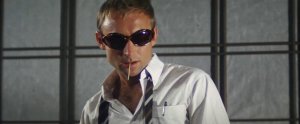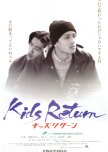A melancholic goodbye to the dreams of youth
A melancholic goodbye to the dreams of youth, Kids Return is easily one of Takeshi Kitano's most personal films, one with a strong empathy for disenfranchised youth while also looking forward to what the future holds. At the story's core, we have the theme of friendship and life choice, represented by the path and decisions of the main characters but still retrains of all Kitano's trademarks and stylings from the affectionately stupid pranks of the leads to the recurring appearance of a twin comedy group, who banter in the style Kitano's own "Two Beats" double act, but it's organized, more confident. He knows what he wants to say, and how he wants to say it. Having grown up in poverty, Kitano likely felt some kinship with his prankster punk anti-heroes but refreshingly refuses to sugar-coat their more disreputable behaviour. They are surly and disrespectful with bad attitudes and a streak of believable, if unfortunate, cruelty. Yet Shinji and Masaru suffer their share of beatings and misfortune as boxing proves no more salvation for the former than the yakuza life suits the latter. The dual messages that there are no shortcuts to success and a lack of diligence can undo the most promising young dreams might seem conservative but the film is more complex than that. Takeshi places his protagonists in a world manipulated by embittered old men whose mixed messages and bad advice leave them uncertain about what is right and wrong. These are not triumphant stories but the film still ends on a frail yet persuasively hopeful note. After his near-fatal motorcycle accident, there was supposedly doubt as to whether Takeshi Kitano would ever work again, with his usual outstanding direction, sumptuous photography and yet another incredible score by Joe Hisaishi, Kids Return crushes pretty much crushes all doubts in one fell swoop.
Vond je deze recentie nuttig?







